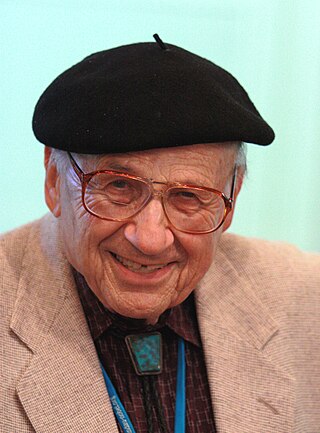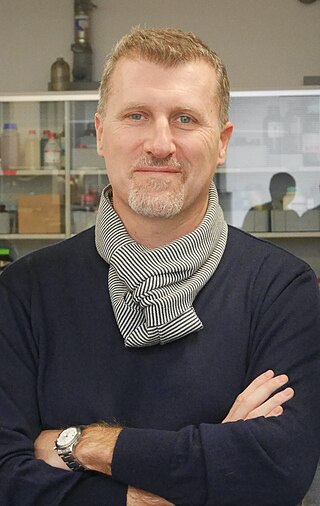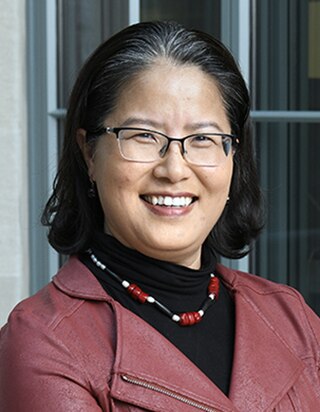
Walter Kohn was an Austrian-American theoretical physicist and theoretical chemist. He was awarded, with John Pople, the Nobel Prize in Chemistry in 1998. The award recognized their contributions to the understandings of the electronic properties of materials. In particular, Kohn played the leading role in the development of density functional theory, which made it possible to calculate quantum mechanical electronic structure by equations involving the electronic density. This computational simplification led to more accurate calculations on complex systems as well as many new insights, and it has become an essential tool for materials science, condensed-phase physics, and the chemical physics of atoms and molecules.

The Journal of Physical Chemistry A is a scientific journal which reports research on the chemistry of molecules - including their dynamics, spectroscopy, kinetics, structure, bonding, and quantum chemistry. It is published weekly by the American Chemical Society.

David S. Eisenberg is an American biochemist and biophysicist best known for his contributions to structural biology and computational molecular biology. He has been a professor at the University of California, Los Angeles since the early 1970s and was director of the UCLA-DOE Institute for Genomics & Proteomics, as well as a member of the California NanoSystems Institute (CNSI) at UCLA.
Jeffery W. Kelly is an American businessman and chemist who is on the faculty of the Scripps Research Institute in La Jolla, California.

The College of Engineering (CoE) is one of the three undergraduate colleges at the University of California, Santa Barbara.

Martin Gruebele is a German-born American physical chemist and biophysicist who is currently James R. Eiszner Professor of Chemistry, Professor of Physics, Professor of Biophysics and Computational Biology at the University of Illinois Urbana-Champaign, where he is the principal investigator of the Gruebele Group.

Ruth Nussinov is an Israeli-American biologist born in Rehovot who works as a Professor in the Department of Human Genetics, School of Medicine at Tel Aviv University and is the Senior Principal Scientist and Principal Investigator at the National Cancer Institute, National Institutes of Health. Nussinov is also the Editor in Chief of the Current Opinion in Structural Biology and formerly of the journal PLOS Computational Biology.
Robert Tycko is an American biophysicist whose research primarily involves solid state NMR, including the development of new methods and applications to various areas of physics, chemistry, and biology. He is a member of the Laboratory of Chemical Physics in the National Institute of Diabetes and Digestive and Kidney Diseases at the National Institutes of Health in Bethesda, Maryland, USA. He was formerly a member of the Physical Chemistry Research and Materials Chemistry Research departments of AT&T Bell Labs in Murray Hill, New Jersey. His work has contributed to our understanding of geometric phases in spectroscopy, physical properties of fullerenes, skyrmions in 2D electron systems, protein folding, and amyloid fibrils associated with Alzheimer’s disease and prions.
Robert Walter Zwanzig was an American theoretical physicist and chemist who made important contributions to the statistical mechanics of irreversible processes, protein folding, and the theory of liquids and gases.
Alison Butler is a Distinguished Professor in the Department of Chemistry and Biochemistry at the University of California, Santa Barbara. She works on bioinorganic chemistry and metallobiochemistry. She is a Fellow of the American Association for the Advancement of Science (1997), the American Chemical Society (2012), the American Academy of Arts and Sciences (2019), and the Royal Society of Chemistry (2019). She was elected a member of the National Academy of Sciences in 2022.
Martin F. Jarrold is a physical and analytical chemist known for contributions to ion-mobility spectrometry, heat capacity measurements of metal clusters, and charge detection mass spectrometry. Martin is the Robert & Marjorie Mann Chair in the Department of Chemistry at Indiana University.
Katherine Birgitta Whaley is a professor of chemistry at the University of California Berkeley and a senior faculty scientist in the Division of Chemical Sciences at Lawrence Berkeley National Laboratory. At UC Berkeley, Whaley is the director of the Berkeley Quantum Information and Computation Center, a member of the executive board for the Center for Quantum Coherent Science, and a member of the Kavli Energy Nanosciences Institute. At Lawrence Berkeley National Laboratory, Whaley is a member of the Quantum Algorithms Team for Chemical Sciences in the research area of resource-efficient algorithms.
Ka Yee Christina Lee is Executive Vice President for Strategic Initiatives and the David Lee Shillinglaw Distinguished Service Professor in the Department of Chemistry University of Chicago. She works on membrane biophysics, including protein–lipid interactions, Alzheimer's disease and respiratory distress syndrome. She is a Fellow of the American Institute for Medical and Biological Engineering and American Physical Society.
Jean Marie Carlson is a professor of complexity at the University of California, Santa Barbara. She studies robustness and feedback in highly connected complex systems, which have applications in a variety of areas including earthquakes, wildfires and neuroscience.

Raffaele Mezzenga is a soft condensed matter scientist, currently heading the Laboratory of Food and Soft Materials at the Swiss Federal Institute of Technology in Zurich. He is among the 0.1% most cited scientists according to the Clarivate 2023 Highly Cited Researchers list in the cross-field discipline.

Rachel A. Segalman is the Edward Noble Kramer Professor and Department Chair of Chemical Engineering at University of California, Santa Barbara (UCSB). Her laboratory works on semiconducting block polymers, polymeric ionic liquids, and hybrid thermoelectric materials. She is the associated director of the Center for Materials for Water Energy System, an associate editor of ACS Macro Letters, and co-editor of the Annual Review of Chemical and Biomolecular Engineering.
Jennifer L. Ross is an American physicist who is Professor and Chair of the Department of Physics at Syracuse University. Her research considers active biological condensed matter physics. She was elected fellow of the American Physical Society in 2018 and American Association for the Advancement of Science in 2022.
Jean Baum is an American chemist. She is the distinguished professor of chemistry and chemical biology at Rutgers University, where she is also vice dean for research and graduate education in the school of arts and sciences, and also vice chair of the department of chemistry and chemical biology. Her research investigates protein–protein interaction and protein aggregation using nuclear magnetic resonance spectroscopy (NMR) and other biochemical and biophysical techniques. She serves as treasurer for the Protein Society.
Susannah L. Scott is a Canadian-American chemist who is Professor of Surface Chemistry and the Duncan and Suzanne Mellichamp Chair in Sustainable Catalysis at the University of California, Santa Barbara. Her research considers the design of heterogeneous catalysts for the efficient conversion of feedstocks and catalysts that improve the environment. She serves as an Executive Editor of ACS Catalysis and is a Fellow of American Association for the Advancement of Science.

Songi Han is an American chemist who is a professor in the department of chemistry and biochemistry at Northwestern University. Her research considers electron and nuclear spins as sensors and detectors. She was elected a Fellow of the International Society of Magnetic Resonance in 2019 and president of the International EPR Society in 2020.









